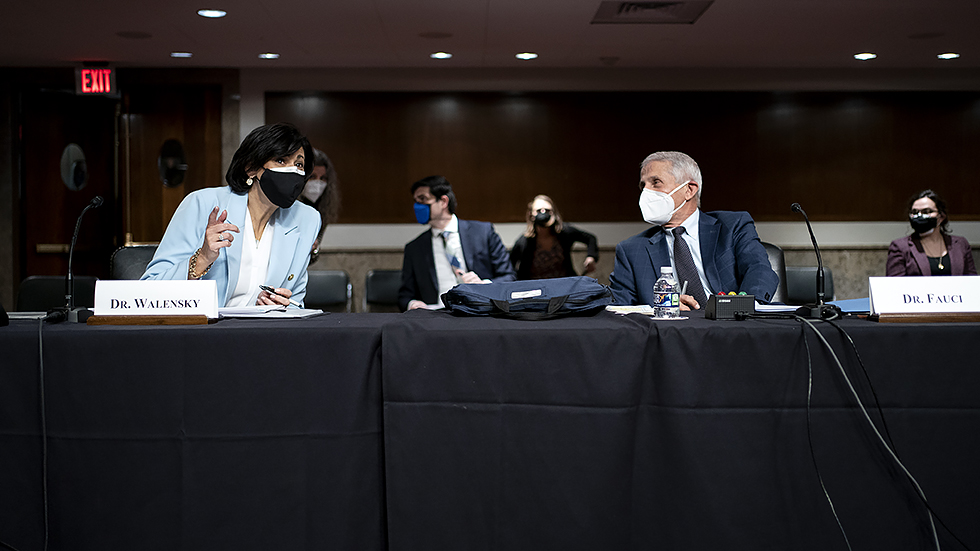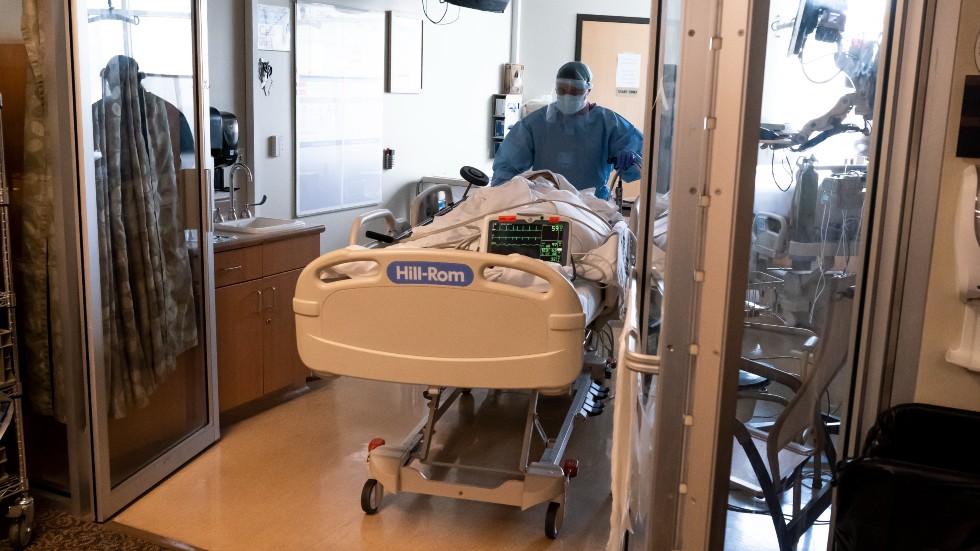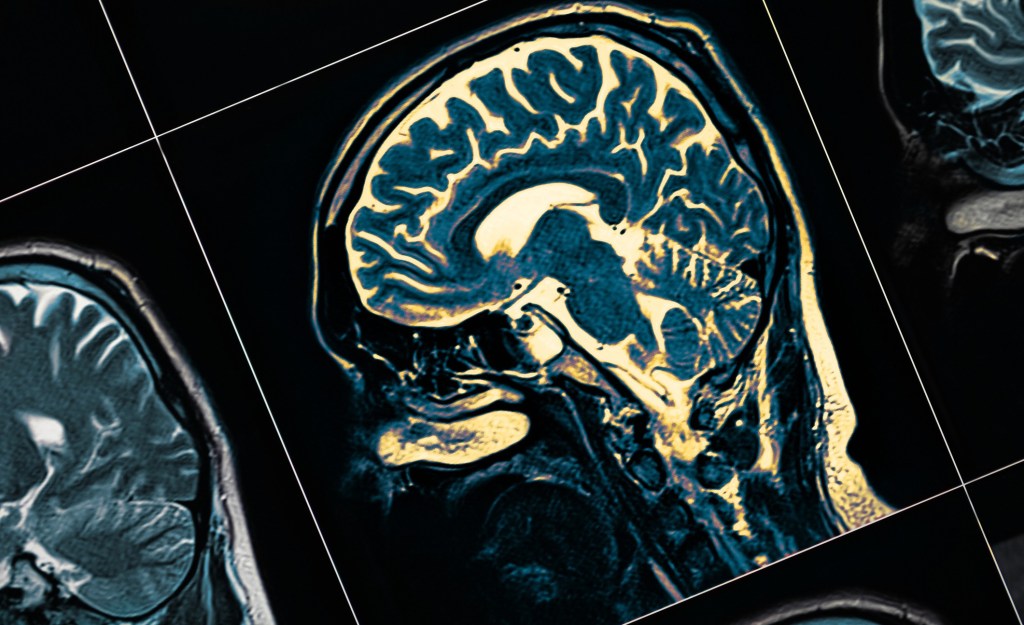Overnight Health Care — Biden officials take heat at Senate hearing
Welcome to Tuesday’s Overnight Health Care, where we’re following the latest moves on policy and news affecting your health. Subscribe here: digital-stage.thehill.com/newsletter-signup.
A Maryland doctor performed the first successful animal-to-human heart transplant with a pig heart potentially opening up “an important new option for patients in the future.”
Today’s big story: Biden administration health officials had a long day answering some pointed questions before the Senate Health Committee.
For The Hill, we’re Peter Sullivan (psullivan@digital-stage.thehill.com), Nathaniel Weixel (nweixel@digital-stage.thehill.com) and Justine Coleman (jcoleman@digital-stage.thehill.com). Write to us with tips and feedback, and follow us on Twitter: @PeterSullivan4, @NateWeixel and @JustineColeman8.
Let’s get started.
Health officials slammed over messaging

There were a lot of tough questions over several hours on Tuesday for an array of administration health officials at a Senate hearing.
Sen. Richard Burr (N.C.), the top Republican on the Senate Health Committee, blasted the administration’s difficulties in communicating information on testing, boosters and isolation.
“This administration has time and again squandered its opportunities and made things worse in the decisions you’ve made on testing and treatments and most crucially in communicating with the American people,” Burr said during the hearing.
“I’m hoping that you’ll understand that my criticism comes from a place of concern. Because your communication efforts are a mess and have only made things worse,” Burr added.
Burr slammed last summer’s announcement — and then reversal — that vaccinated people did not have to wear masks indoors.
The senator said the rollout of boosters was a “disaster” and the recent update to the isolation and quarantine period left people confused.
Also testing: Burr expressed frustration at the continued shortage of at-home tests and questioned the administration’s ability to procure the 500 million tests that President Biden announced in December.
“Something’s not right here, guys, on testing,” Burr said, noting that there are currently only contracts signed for 50 million tests.
FAUCI, PAUL CLASH AGAIN
These hearings now always seem to include a showdown between White House medical adviser Anthony Fauci and Sen. Rand Paul (R-Ky.).
During the pair’s latest clash Tuesday, Fauci accused Paul of putting him in danger with personal attacks.
“This happens all the time. You personally attack me, with absolutely not a shred of evidence of anything you say. So I would like to make something clear to the committee: You’re doing this for political reasons,” Fauci told Paul.
During the hearing Paul went after Fauci on several topics, including blaming Fauci for school closures and conflating emails purportedly about the origins of the virus, among other issues.
In pushing back on Paul, Fauci pointed out that the police in Iowa recently arrested an armed man just before Christmas who claimed he was traveling from Sacramento to Washington, D.C., in order to “kill Dr. Fauci.”
According to reports at the time, the man was arrested in possession of an assault rifle and ammunition, as well as a “kill list” of people he planned to attack in D.C., including Fauci, President Biden and former Presidents Bill Clinton and Barack Obama.
“So I ask myself why would [the] senator want to do this? You go to Rand Paul website, and you see ‘fire Dr. Fauci’ with a little box that says ‘contribute here!’ You can do $5, $10, $20, $100. So you are making a catastrophic epidemic for your political gain,” Fauci told Paul.
US sets new COVID-19 hospitalization record

The United States on Tuesday set a new record for COVID-19 hospitalizations, with more than 145,000 people in the hospital with the virus.
- The 145,982 people hospitalized with COVID-19, according to Department of Health and Human Services data, surpasses the previous peak of about 142,000 people set in January 2021, during a major winter surge before vaccines were widely available.
- People who are vaccinated and especially those who received their booster shots are well protected against severe disease and hospitalization from the virus.
- But the sheer number of cases of COVID-19, fueled by the highly transmissible omicron variant, means that even a small percentage leading to hospitalization causes a surge that strains hospitals.
The hospitalizations are driven in large part by people who are unvaccinated. Carlos del Rio, an infectious disease doctor at Emory University and at Grady Hospital in Atlanta, said last week that 80 to 90 percent of the patients primarily in the hospital for COVID-19 were unvaccinated, or in some cases had two shots of vaccine (without a booster) and had an underlying condition.
About a third of the patients with the virus, he said, have tested positive for COVID-19 but are not primarily in the hospital because of the virus.
Big picture: Overwhelmed hospitals also reduce the quality of care for vaccinated people who need help for non-COVID-19 issues, like a car crash or a heart attack.
RED CROSS DECLARES FIRST NATIONAL BLOOD CRISIS IN US
The Red Cross has declared its first-ever national blood crisis in the U.S.
In a statement emailed on Tuesday, the organization warned members of the public of the consequences of its worst blood shortage in more than a decade — including doctors being forced to make “difficult decisions” about which patients receive blood transfusions over others.
The American Red Cross said it had “less than a one-day supply of critical blood types” and has had to limit distributions to hospitals.
“At times, as much as one-quarter of hospital blood needs are not being met,” the organization said.
The COVID-19 pandemic has seen a 10 percent overall decline in the number of people donating blood, in addition to ongoing blood drive cancellations and staffing limitations.
Call for donations: The Red Cross urged the public to make an appointment to donate blood as “blood and platelets donations are critically needed to help prevent further delays in vital medical treatments.”
Donors of all blood types — especially type O — are being urged to make an appointment now to give in the weeks ahead
CMS floats limited Alzheimer’s drug coverage

Medicare will cover the controversial Alzheimer’s drug Aduhelm only if a patient is enrolled in a clinical trial, the Centers for Medicare & Medicaid Services (CMS) proposed Tuesday.
The proposed decision means that CMS would only cover Aduhelm and similar types of drugs if the trial were approved by the agency and conducted in a hospital outpatient setting.
The drug has drawn controversy for its price and because the Food and Drug Administration (FDA) approved it despite doubts from experts about its effectiveness, as well as potential safety concerns.
The CMS review process found that while “there may be the potential for promise with this treatment, there is also the potential for harm to patients. This harm may range from headaches, dizziness, and falls, to other potentially serious complications such as brain bleeds,” CMS Chief Medical Officer Lee Fleisher said in a statement.
Disappointment: The proposed decision is a blow to Alzheimer’s advocacy groups, as well as the drug’s manufacturer Biogen.
“This draft coverage determination denies the daily burden of people living with Alzheimer’s disease. Coverage with evidence development (CED) under a randomized clinical trial will exclude almost all patients who may benefit. This will significantly limit patient access to an FDA-approved treatment, especially for underserved patients as evidenced in other CED determinations,” the company said.
WHAT WE’RE READING
- CDC weighs recommending better masks against omicron variant (The Washington Post)
- Omicron may be headed for a rapid drop in US and Britain (The Associated Press)
- Disabled Americans feel abandoned by CDC. Now, CDC is desperate to make amends (Rolling Stone)
STATE BY STATE
- COVID outbreaks at Louisiana nursing homes infect nearly 1,200 staff members (New Orleans Public Radio)
- COVID-19 test hoarding in Minnesota limits appointments amid omicron surge (Star Tribune)
- Fire closes hospital and displaces staff as Colorado battles omicron (Kaiser Health News)
- Michigan reports eight new K-12 COVID outbreaks as students begin return to school (MLive.com)
That’s it for today, thanks for reading. Check out The Hill’s health care page for the latest news and coverage. See you on Wednesday.
Copyright 2023 Nexstar Media Inc. All rights reserved. This material may not be published, broadcast, rewritten, or redistributed. Regular the hill posts
Video/Hill.TV










